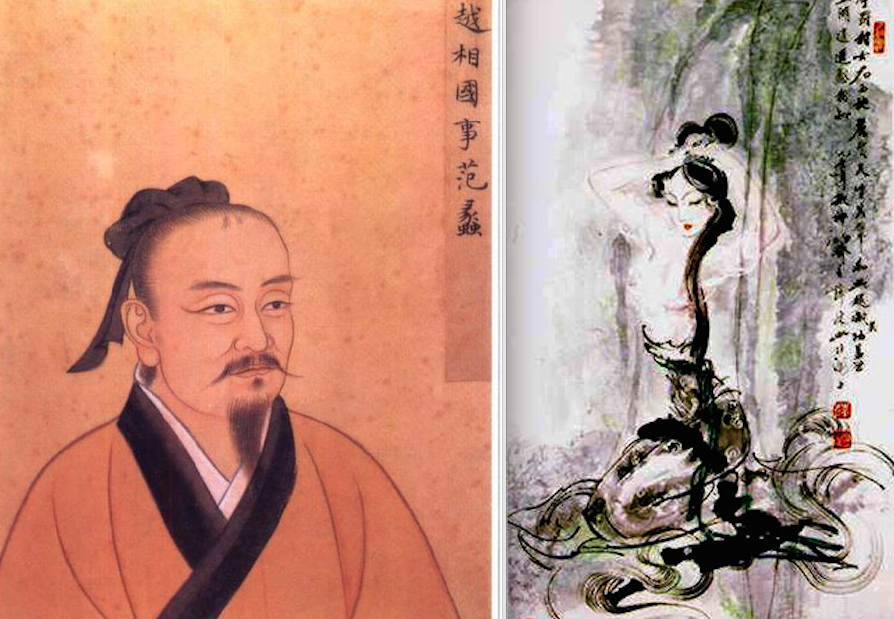 Gather round, my children and allow me to regale you with the wonderful tale of the adventures of Fan Li and Xi Shi – military strategist, femme fatale, and all-around badasses.
Gather round, my children and allow me to regale you with the wonderful tale of the adventures of Fan Li and Xi Shi – military strategist, femme fatale, and all-around badasses.
Fan Li was born in a town called Yuan Sanhu sometime in the late 6th Century BCE in a kingdom called Yue, near the modern city of Wuxi (a few hours drive from Shanghai). Born to a poor family, he befriended a man who recognized his talent and wisdom and brought him to the capital to become an advisor to the king, Goujian. King Goujian was clever as near as we can tell a good king but he was a little too ambitious for his own good.
Despite Fan Li’s warnings, not long later he attacked a nearby kingdom called Wu. Wu proceeded to slap Yue’s army like a window slaps an errant bird and take its king and counselors as hostages. Records are thin during this period but it’s safe to assume that Goujian and his subjects were not treated well. Some tales tell of harsh torture at the hands of Wu jailors. After three long years in captivity, Fan Li and his king were eventually released to go home and lick their wounds. But that’s not what what they did. Team Yue started hatching a plan to get their revenge – something more clever and subtle than a simple assault on the Wu army. No, they had a plan that required a more feminine touch.
So Fan Li found Shi Yiguang, otherwise known as Xi Shi – the daughter of a tea trader. And a woman who would later be called one of the four great beauties of Chinese history.
To say that Xi Shi was incredibly beautiful would probably be insult because it would put on an uglier escelon than she deserved. She was so attractive that a new word would have to be coined in order to describe her (in fact, modern Chinese has coined a phrase from her name to describe a person as beautiful). One writer said of her, “were she plump, you would admire her plumpness, were she thin you would admire her for being slender.” Another said that if she looked into a pond and the fish saw her, the animals lost all capacity for thought, and sank to the bottom.
It was well known that the king of Wu, King Fuchai, was a womanizer of the first degree and couldn’t say no to a pretty face. Fan Li realized he had found the perfect spy to take down the kingdom of Wu. Xi Shi went to King Fuchai, ostensibly as a gift from Yue and immediately the greedy king was transfixed by her, giving her gifts, prizing her above all others and building her a palace. For the next 17 years she slowly poisoned his mind, eroding his ability to rule and driving away his cleverest advisors. One of Wu’s greatest generals, Wu Zixu, even saw through her scheme but she quickly persuaded the king to have the man executed.
In 473 BCE, Yue struck again. This time Wu was totally unprepared and collapsed. Fuchai, humiliated and exposed, committed suicide as his kingdom was folded into Yue. After that, his job done and his enemy vanquished, Fan Li retired from public service. He went to live on the shores of nearby Lake Taihu with Xi Shi by his side. Which was fair, I suppose. After taking down an entire kingdom with just her wits and good looks, she was probably entitled to a little relaxation.
There they lived the remainder of their lives, travelling the placid, fog-laced waters of Taihu. Fan Li became a businessman and was so successful he wrote a number of books about good business. It was on the banks of Taihu that he laid down some of the basic foundations of Chinese business – focusing on organization, open-mindedness, honesty, and shrewd observation of the ebb and flow of markets.

You might be asking why this fascinating historical character has found his way onto the pages of a science blog. It was also in this retirement that Fan Li wrote the world’s first aquaculture textbook. Well, textbook is a strong word, at just 400 characters it was more of a pamphlet. But in it, Fan Li lays out the basic principles that would go on to dominate 2,000 years of Chinese fish farming, which makes up a shocking 70 percent of the world’s aquaculture.
The book (available in its entirety here translated into English) is full of all kinds of useful nuggets that are still applicable today. Dimensions, number of baby fish, maintainance, all the things an aspiring fish farmer ought to know. For instance, he advises that putting turtles into the ponds can help prevent the “flood dragon.” While turtles don’t prevent floods, they are very useful for recycling nutrients and represent Li’s awareness of the importance of biodiversity in aquaculture.
Fan Li’s words are carved into a tall stone wall I saw while visiting a facility under the Chinese Academy of Sciences last August alongside dozens of experimental breeding ponds. Scientists there see Fan Li as their founder father and as a tie to the ancient traditions they are try to maintain as China modernizes. It doesn’t hurt that he’s also an aquaculture nerd who married the sexiest woman of his day, one scientist told me.
The researchers there and in dozens of other similar centers are working to alter age-old breeding and water cleaning techniques to improve water quality and lessen the impact of a sprawling fish farming infrastructure that has overwhelmed the country’s waterways (I write about the details of this nationwide effort in the current Scientific American). But China has changed a lot since those days. Miles and miles of dense urban sprawl surround Taihu causing the waters in Fan Li’s old home to run black a few years ago after a disturbing algae bloom related to all the new pollution leeched into the local waterways.
 Today, China is beset by a dizzying number of environmental crises – in the air, on the water, and in the food. Many observers in the West worry that China simply doesn’t have an ethic of conservation or care for the environment. But that’s not what I saw when I was there. The 2007 bloom and a number of other incidents seem to have been a wake up call for the region and may end up as a watershed moment for the Chinese people, not unlike the year that a tributary of Lake Erie lit on fire or the day the passenger pigeon went extinct in America.
Today, China is beset by a dizzying number of environmental crises – in the air, on the water, and in the food. Many observers in the West worry that China simply doesn’t have an ethic of conservation or care for the environment. But that’s not what I saw when I was there. The 2007 bloom and a number of other incidents seem to have been a wake up call for the region and may end up as a watershed moment for the Chinese people, not unlike the year that a tributary of Lake Erie lit on fire or the day the passenger pigeon went extinct in America.
Early in the morning, as the fog lifts over Taihu and nearby Fan Li Park, It seems as if a change might be in the air. As I walked on the shoreline past old people doing their morning calisthenics and young people walking their dogs and looking over the lake, I can’t help but think there is something universal in caring for nature. Something timeless. And looking out over the soup green water, I can almost see the old minister and his beautiful bride on deck of their boat, arm in arm, sailing out over the lake.

This reporting was supported by a grant from the Mongabay Special Reporting Initiatives program
Original Photos: Dominic Bracco II
“one of the four great beauties of Chinese history”? How could they tell? Pictures can lie, and who was keeping track of this? Weird.
Ha. I don’t think it’s a very objective measure, Gail. I notice that in all four cases the women use their beauty to change minds or alter politics or shift culture. So I guess they judge it by the outcome. And anyone familiar with the book “The Princess Bride” knows that Princess Buttercup is the world’s most beautiful woman.